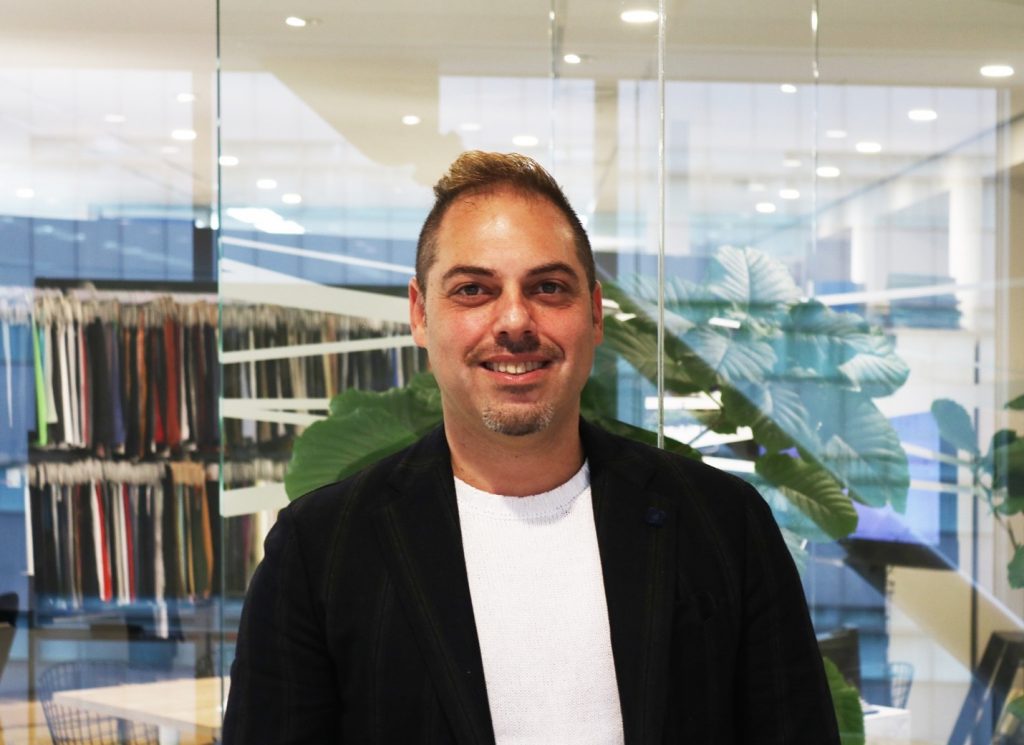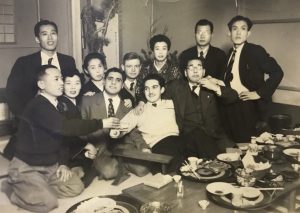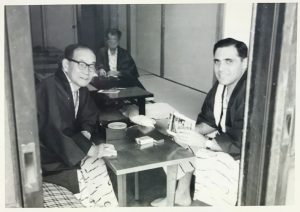
- ARAB NEWS
- 06 Jul 2025

Nader Sammouri Osaka
What drove a Lebanese merchant to end up in Japan during World War 1? And how did he carry on a textile business almost a century after? These were the questions which sparked a deep discussion with Hani Debs, the current Executive Vice President at Debs Corporation, based in Osaka.
Debs Corporation is a manufacturer and supplier of textile piece goods, primarily for the womenswear market, which integrates the most innovative yarns and finishing techniques to differentiate itself with affordable luxury.
The Debs family originated from Syria and lived mostly in Lebanon, both areas being connected under the belt of the Ottoman Empire.
Speaking exclusively to Arab News Japan, Debs said “we’ve always been merchants and always worked with textiles.” He discussed the legacy which his family holds spanning a little over a decade of Arab management of a textile business in Japan starting with Ezzat Debs during 1917 almost one year before the first world war came to an end, then joined by Ezzat’s brother Abdul Hadi Debs to Fouad Debs, nephew of Ezzat and Abdul Hadi, and carried on today by Hani Debs, Fouad’s son, as a successor of the legendary merchant family.
Ezzat Debs arrived to Kobe port, which was one of the first ports to open in Japan in 1917 to start a business that carried on a legacy to the family until today.
“Japan wasn’t anything like it is today. Roads were full of dirt, people wore traditional kimonos, and to see a foreigner for a country who was closed up for hundreds of years was like watching aliens arrive from outer space.” Debs told Arab news Japan.
Japan is known today to speak very little English in relation to other countries so going back almost a decade in time, it may seem impossible to comprehend doing business in such an insular place.
“But like any country which opens up, there is always a domestic group of people who want to export and deal with the outside and we were surrounded by those people in Japan, foreign educated Japanese at a higher point in society who studied at universities like Oxford and Cambridge.” He said and added that Japanese merchants were fully capable of English communication and were used to deal with foreign merchants.
“Foreigners had their own small community that supported each other,” Debs said stressing on the fact that speaking the Japanese language wasn’t that necessary.
Debs also expressed how more open the Japanese were in the old times, and the fact that they actually became more insular with time because of the development of a new hierarchy in the government which changed from the samurai class to the farmer class.

In 1928, Abdul Hadi Debs arrived to Japan to assist his brother Ezzat and in 1932, a Debs & company was established in Yokohama. 17 years later, WW2 happened and Japan was hit by two atomic bombs in 1945 which shook the entire country. Debs expressed how his family dealt with that saying: “Before the US air raids on japan, the foreign community got an advanced warning. There were churches and mosques protected as well.”
He added that in particular to the Debs family and what they knew, middle-eastern merchants went in hiding in the mountains of Kobe area in one of the little villages.
“They used to stay there and help each other. That was where they actually networked and created a strong bond. They were less than a 100 and became good friends,” he said emphasizing that during times of crisis people get to bond with their community on a more profound level.
“Most of these people left to other parts of the world to south America, US, Europe and some back to the middle east which is how we established a global network and starting trading with each other. We are still friends until today,” he noted.
His father, Fouad Debs arrived to japan in 1950. Faced with difficult times, he hesitated whether he should stay but as things started to gain momentum post-world-war 2, opportunities kept pulling him back to build on what his family started.

When comparing Japan to the Middle East, there are things that are worthy to note in terms of similarities and differences. One of them is the strong sense of community and family that both countries have and take pride of. Debs indicated that in Japan, each city and prefecture has its own character and pride and middle-easterners share that same kind of pride for their community which generates a kind of obligation to support your community.”
Another trait common between the two is hospitality, very different from the way middle-easterners do it (Bring in all the food), but in Japan described by the term “Omotenashi (おもてなし)” meaning hospitality which emphasizes the generosity that middle-easterners have towards strangers.”
When asked about the differences, Debs said: “One of the big differences is punctuality, which boils down to responsibility. The Japanese have a strong responsibility to be on time “Giri (義理)” or strong sense of duty because they consider it to be shameful to have someone wait. If a train today is late for 2 minutes for instance, the train company would hand all passengers passes to show to their companies as proof that they were late because of them. Another example is that if a Japanese person promises to meet you at 9am, he will be expected by a Japanese counterpart to show up at 8:50am, 10 minutes earlier, assuming that arriving at 9 would be late.”
He added that because of that sense of responsibility that his Japanese employees have, he can travel for instance and be certain that people will be working morally without the need to be managed for their sense of duty is intrinsic.
Many employees at Debs Corporation enjoy working for the company wiht Yasunori Kawamoto, sports division senior manager at Debs Corporation sharing some insights with Arab News Japan about the unique culture which he takes part of saying:
“Arabs seem to take care of their family and employees. There is a more personal level of communication and connection compared to that with the Japanese. For example, at times, we are invited to Mr. Hani’s residence in Kobe for a casual meetup. I don’t think Japanese companies are likely to do that. Thus I find it easier to work here.”
Seiko Hirooka, fashion division senior manager at Debs Corporation nodded and added that it is quite comfortable working for Arab managed corporation, and even noted some things from her experience talking with Arab agent’s wives which struck her as similar between the cultures saying:
“I personally had a sense that the cultural aspects between the two are very similar. Arabs like the Japanese tend to follow certain traditional ways of behavior. Although things are changing, Arabs wives like Japanese wives for instance tend to stay home.”

Debs Corporation has a diverse environment with people of strong character. Aside from the Japanese, many being born in Europe or the US, there are people from China, Lebanon and Turkey. English is a requirement from the employees at Debs since most of their customers reside abroad, employees are expected to have an international communication mindset.
“Any business is about people. It is important to have the right people who share your values and goals. Communication is everything and to do good communication you need good people,” Debs explained.
In 2002, Amana Corporation, which specializes in producing fabrics for the Middle East market (KSA being a big market among Dubai and Yemen basically Islamic areas where the “Abaya” exists within the culture).
“Amana produces only black and strengthens the concept of made in japan and carries that value in the Middle East market,” he said.
It is worthy to mention that Debs employees dealing with the Arab market at times, got “infected” with the Arab language. Yasunori stated that hearing Arab wasn’t that common at all in Japan and he thought that it was really unique to hear its sound.
“I like the way Arabic sounds. I picked up some basic words like Shokran,” Yasunari said.
Seiko expressed a sense of surprise noting that when Arabs talk to each other, she noticed that their tone changed as if it became stronger or at least that is how it sounded like to her.
Debs Corporation is a proof of the heights which people can achieve when they are willing to explore and stay open.
“I emphasize a lot on cross cultural exchange. You can only learn from other cultures. It is never a bad thing. Cultures should learn from each other instead of just dealing with each other,” Debs said.
Debs closed the discussion by stating his vision for the future saying:
“I think japan is still a land of opportunity and it is so undervalued and so misunderstood in the world. I want my company to be the portal which connects and helps take away all these misconceptions of Japan. Just like our founders saw opportunities here, I still feel there is much more to do just simply because there are less of us foreigners here to do that. My vision is to link cultures especially the Arab world with japan. They have so much to learn from each other and I want to be that link so I would like to say made with Japan instead of made in Japan. Nothing is made here and there anymore. It’s all about the value presented. I think the Japanese value is something that we would like to export so I say let us make it with Japan.”